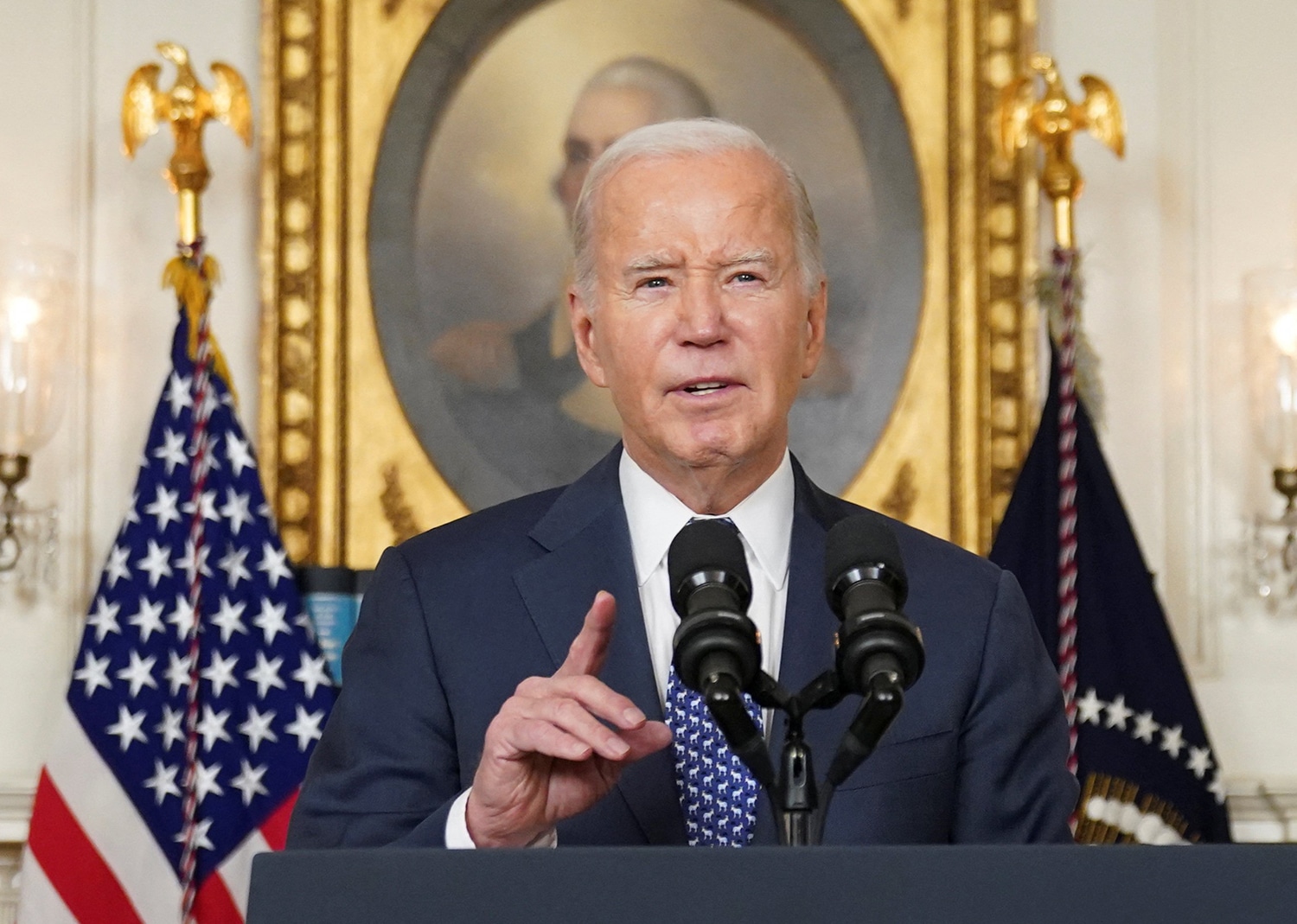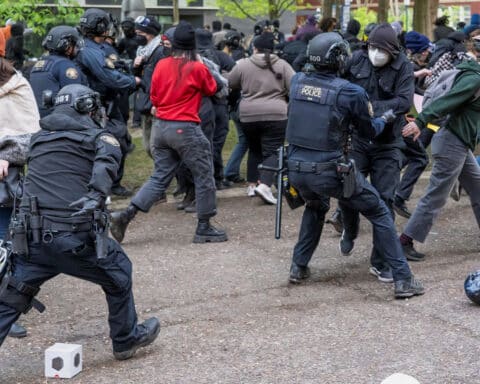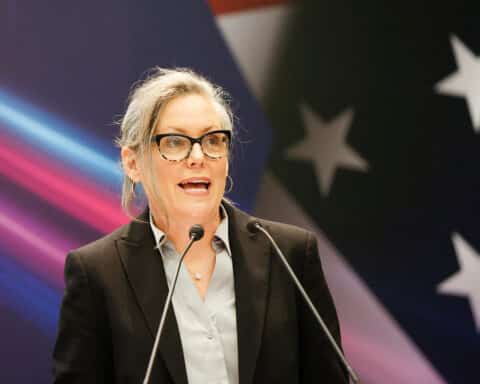WASHINGTON (OSV News) — President Joe Biden defended himself Feb. 8 after a special counsel’s report on his handling of classified documents said he showed signs of memory loss. Also in Washington the same week, the Supreme Court heard oral arguments in a case concerning former President Donald Trump’s ballot eligibility, and a bipartisan border deal failed in the Senate.
Biden defensive after special counsel report
Special Counsel Robert Hur on Feb. 8 released a long-awaited report on Biden’s handling of classified documents. While the report found no criminal charges against Biden are warranted — unlike how Trump mishandled classified documents, where he was charged — it also said investigators saw evidence that Biden’s memory was “significantly limited” in interviews.
“We have also considered that, at trial, Mr. Biden would likely present himself to a jury, as he did during our interview of him, as a sympathetic, well-meaning, elderly man with a poor memory,” it said.
In televised remarks from the White House the same evening, Biden took umbrage with that characterization, particularly with a passage of the report suggesting he did not remember when his late son, Beau Biden, died of cancer.
“How in the hell dare he raise that?” Biden said, adding that during a lengthy interview with investigators, he thought the subject of his son’s death “wasn’t any of their damn business.”
Biden added that he still wears his late son’s rosary beads and the family holds an annual service near Memorial Day in his memory. Beau Biden died May 30, 2015.
Elsewhere in his remarks, when answering questions from reporters, Biden mistakenly referred to Egyptian President Abdel Fattah el-Sissi as the president of Mexico.
However, such flubs are relatively common for public officials.
In October remarks in New Hampshire, Trump praised Viktor Orbán, Hungary’s authoritarian prime minister, but referred to him as “the leader of Turkey.” He also has referred to his last remaining major rival for the GOP nomination, former U.N. Ambassador Nikki Haley as former House Speaker Nancy Pelosi.
Supreme Court justices appear critical of Colorado’s effort to remove Trump from state ballot
During oral arguments Feb. 8, the U.S. Supreme Court considered a December ruling by the Colorado Supreme Court that found Trump ineligible for the White House under the U.S. Constitution.
Colorado’s high court held in a 4-3 decision “that Trump is disqualified from holding the office of president under Section 3 of the 14th Amendment,” finding that Trump incited an insurrection for his role in the Jan. 6, 2021, riot at the U.S. Capitol, in which supporters of the then-president attempted to thwart the certification of Biden’s victory in the 2020 election.
The Civil War-era provision in question was designed to keep former Confederates from returning to government following their rebellion against the United States.
But justices across the court’s ideological spectrum appeared skeptical of Colorado’s argument.
Justice Elena Kagan asked, “Why should a single state have the ability to make this determination not only for their own citizens but for the rest of the nation?”
Justice Ketanji Brown Jackson said Section 3 bars insurrectionists from serving as presidential electors but does not specifically identify the office of president, questioning whether the framers were focused on officials at the local and state levels rather than the federal level.
Jackson called it a “troubling” aspect of the argument that “they were listing people that were barred and ‘president’ is not there.”
“And so I guess that just makes me worry that maybe they weren’t focusing on the president,” she said.
Trump faces dozens of felony charges in four separate criminal cases related to his alleged attempts to overturn the 2020 election and his mishandling of classified documents, among other misconduct. But the specific charge of insurrection has not been among them to date.
Senate advances national security supplemental including aid to Ukraine, Israel and Taiwan without border provisions
The Senate voted Feb. 8 to proceed with debate on a bill that would provide military and humanitarian aid to Israel, Ukraine and Taiwan, among other measures.
An official with Catholic Relief Services applauded the inclusion of humanitarian aid along with military aid in the measure under consideration in the Senate.
“We, as people of faith, cannot neglect the cries of countless families impacted by conflict, hunger and displacement,” Bill O’Keefe, executive vice president for mission, mobilization and advocacy at CRS, said in a Feb. 7 statement.
However, it is not yet clear if the legislation itself has enough support to ultimately pass.
The procedural vote came just one day after Republicans in the upper chamber rejected a bipartisan deal that would have tied such aid to border security measures criticized by Catholic migrant advocates, including a provision that would have raised the threshold for asylum eligibility.
Senate Majority Leader Chuck Schumer, D-N.Y., indicated the chamber would stay and work on the legislation until it passes, with another procedural vote scheduled for Feb. 9.
The bill, if passed by the Senate, would face an uncertain future in the House, where a razor-thin Republican majority is increasingly skeptical of providing aid to Ukraine amid Russia’s invasion.
The debate comes as Tucker Carlson, a former Fox News host and a vocal critic of U.S. support for Ukraine, posted a lengthy interview with Putin on X, formerly Twitter, in which Putin argued Russia has a historical claim to Ukrainian land, including Western Ukraine.
Putin said the war would be “over in a few weeks” if the U.S. stopped providing Ukraine weapons to defend itself.
Russia’s occupation has already led to a persecution of the Catholic Church in Ukraine not seen since the Soviet Union. Since 2022, Russian authorities have banned the Ukrainian Greek Catholic Church and other Catholic ministries, including the Knights of Columbus and Caritas, in occupied areas of Ukraine’s Zaporizhzhia region, according to the church’s main communications office in Kyiv.
Carlson was fired from his prime-time anchor slot at Fox News in the aftermath of that company’s $787.5 million defamation settlement with Dominion Voting Systems concerning the network’s false claims covering the 2020 election.





